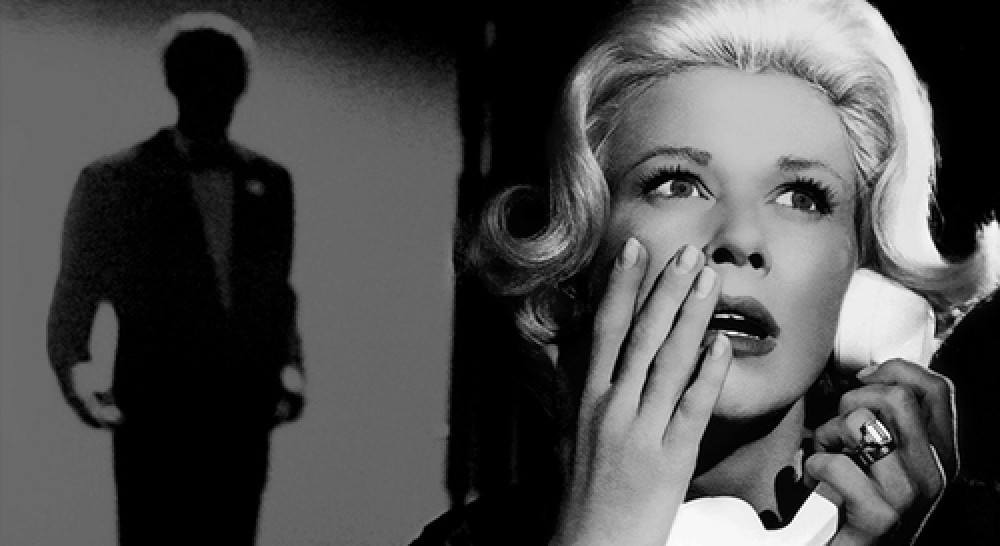Our discussion of Number 13 ranged from the character of the protagonist, Professor Anderson (Greg Wise), his standing in society and how the episode tackled the issue of class, the MR James original short story, both texts’ effectiveness as examples of the ghost story, the male and female gothic, and related texts.
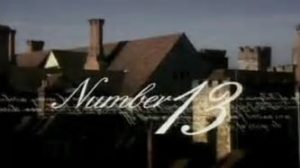 Some of our first comments concerned the initial pomposity of Professor Anderson (Greg Wise). We noted his insistence that his proper title be used, especially when introducing himself at the city hotel in which he stays while researching some old manuscripts. Anderson would have been privileged compared to many in society, most likely attending public school if he later went to an Oxbridge college. It is significant that the only title he has is an academic – and indeed professional – one. He has earned this, rather than inherited it from previous generations.
Some of our first comments concerned the initial pomposity of Professor Anderson (Greg Wise). We noted his insistence that his proper title be used, especially when introducing himself at the city hotel in which he stays while researching some old manuscripts. Anderson would have been privileged compared to many in society, most likely attending public school if he later went to an Oxbridge college. It is significant that the only title he has is an academic – and indeed professional – one. He has earned this, rather than inherited it from previous generations.
The fact that when strange occurrences start to happen to him Anderson accuses others of playing tricks also raises the matter of class. He is sure of himself and, rather than doubting his sanity, assumes that others are persecuting him. We thought this spoke to class anxiety – the worry that those of the new middle classes did not know their place. The theorists Anthony Vidler and Terry Castle’s ideas on the uncanniness of the middle classes were discussed by the group.
Indeed, class played a large part in the adaptation, with Anderson compared to some of the other characters. Anderson is clearly higher status than the hotel landlord, Gunton (David Burke), since he is a customer. He is also distrustful of the silent porter, Thomas (Anton Saunders), appearing rude to him on occasion. The character of Jenkins (Tom Burke), a lawyer, was especially drawn in class terms. We hear and then see him slurping his soup and his easy manner with one of the female guests, Alice (Charlotte Comer) causes Anderson jealousy – especially when we have the impression that Anderson is unhappy that such an inferior male has proved popular with a woman he seems to have romantic interest in.
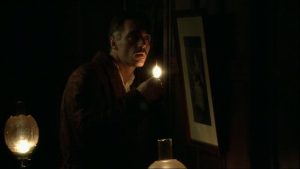 Anderson’s desire is further expressed through a brief dream sequence. Alice is seen lingering near Anderson’s bed chamber, intercut shots of the bed hangings and paintings depicting naked men and women and various flora and fauna. We thought this conveyed Anderson’s repression well. The very brief appearance of Alice in his dream is probably the most interaction he has with her during the episode. In addition, he lacks the imagination to picture her in a nightgown – she wears the dress and earrings she appeared in earlier in the night when her flirting between with Jenkins seemed so distasteful to Anderson. But there is another possible reading. The two men wake up together in a double bed, apparently for safety’s sake, after they and the landlord experience terrifying happenings. We wondered if this was a queering of the text, since Anderson has gained not just homosocial knowledge (the next morning he seems more human, his pomposity punctured he is able to joke with Jenkins), but also perhaps experienced and been the object of homosexual desire. Perhaps Anderson’s earlier jealousy was directed towards Jenkins and not Alice. Both Anderson and Jenkins were inordinately interested in what they thought was going on in the other’s room.
Anderson’s desire is further expressed through a brief dream sequence. Alice is seen lingering near Anderson’s bed chamber, intercut shots of the bed hangings and paintings depicting naked men and women and various flora and fauna. We thought this conveyed Anderson’s repression well. The very brief appearance of Alice in his dream is probably the most interaction he has with her during the episode. In addition, he lacks the imagination to picture her in a nightgown – she wears the dress and earrings she appeared in earlier in the night when her flirting between with Jenkins seemed so distasteful to Anderson. But there is another possible reading. The two men wake up together in a double bed, apparently for safety’s sake, after they and the landlord experience terrifying happenings. We wondered if this was a queering of the text, since Anderson has gained not just homosocial knowledge (the next morning he seems more human, his pomposity punctured he is able to joke with Jenkins), but also perhaps experienced and been the object of homosexual desire. Perhaps Anderson’s earlier jealousy was directed towards Jenkins and not Alice. Both Anderson and Jenkins were inordinately interested in what they thought was going on in the other’s room.
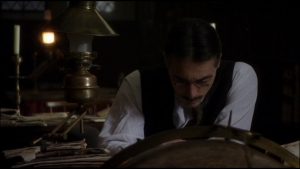 The presence of female characters in the TV version (though it removed mention of Jenkins’ wife and family) was a departure from MR James’ original short story. In addition to this expansion, moving the setting of the story from Denmark to a class-conscious English city seems to draw out this issue far more. The character in the episode seems far more pompous than in MR James’ short story, and has indeed been gifted the title of Professor, so that he can insist on others using it. There were also some particularly visual elements which conveyed Anderson’s class which were less obvious on the page. Anderson was often seen in his professorial pince nez, and we especially noted his impeccable dinner suit.
The presence of female characters in the TV version (though it removed mention of Jenkins’ wife and family) was a departure from MR James’ original short story. In addition to this expansion, moving the setting of the story from Denmark to a class-conscious English city seems to draw out this issue far more. The character in the episode seems far more pompous than in MR James’ short story, and has indeed been gifted the title of Professor, so that he can insist on others using it. There were also some particularly visual elements which conveyed Anderson’s class which were less obvious on the page. Anderson was often seen in his professorial pince nez, and we especially noted his impeccable dinner suit.
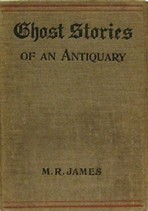 There was much discussion about the character of the cathedral archivist, Mr Harrington (Paul Freeman). While he is a minor character in the short story, his role is expanded in the TV version. In this, Anderson researches the ‘Bishop’s House’ at which witchcraft was said to have been committed by a man called Nicolas Francken, and which is revealed to be the hotel in which Anderson is staying. We thought that Harrington had far more knowledge of the Bishop’s House and Francken than he revealed to Anderson. We remembered that Anderson had told Harrington that he was staying in a hotel which was so superstitious it did not include a room 13. However, when Anderson met Harrington in town and discovered from Harrington that the Bishop’s House was still standing, Harrington did not tell him that it was the hotel in which Anderson was staying. It is suspicious that Anderson finds a sealed letter in the archive which he steals, but later replaces, only to not find it again. We also thought there was possibly a portal between the hotel and the library. Furthermore, we saw a resemblance between Harrington, the shadowy figure who appears on the wall of Anderson’s room, and the ghostly figure of room 13. The latter was especially effectively conveyed, with flickering of the sound and the image recalling older technology (the pre-digital ‘snowy’ reception of some televisions). This poor signal transmission also prompted us to think of spiritualist séances.
There was much discussion about the character of the cathedral archivist, Mr Harrington (Paul Freeman). While he is a minor character in the short story, his role is expanded in the TV version. In this, Anderson researches the ‘Bishop’s House’ at which witchcraft was said to have been committed by a man called Nicolas Francken, and which is revealed to be the hotel in which Anderson is staying. We thought that Harrington had far more knowledge of the Bishop’s House and Francken than he revealed to Anderson. We remembered that Anderson had told Harrington that he was staying in a hotel which was so superstitious it did not include a room 13. However, when Anderson met Harrington in town and discovered from Harrington that the Bishop’s House was still standing, Harrington did not tell him that it was the hotel in which Anderson was staying. It is suspicious that Anderson finds a sealed letter in the archive which he steals, but later replaces, only to not find it again. We also thought there was possibly a portal between the hotel and the library. Furthermore, we saw a resemblance between Harrington, the shadowy figure who appears on the wall of Anderson’s room, and the ghostly figure of room 13. The latter was especially effectively conveyed, with flickering of the sound and the image recalling older technology (the pre-digital ‘snowy’ reception of some televisions). This poor signal transmission also prompted us to think of spiritualist séances.
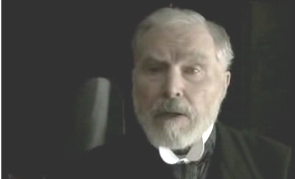 We commented on the effectiveness of the TV episode. We thought it (and especially the shadowy figure and the flickering ghost in room 13) was good and scary. We were especially impressed by David Burke’s moving performance when he learned of the horrible fate suffered by an earlier ‘Cambridge man’ he believed had skipped out on his bill. However, the foreshadowing of this ‘revelation’ and the over-explanation on finding the man’s belongings seemed a little heavy-handed. This is far less the case in the short story. Conversely, we found that the changing of room 13’s physical dimensions was, surprisingly, subtler in the TV version, with the explanation for Anderson’s disappearing case (it had been subsumed into the newly appearing room 13) not obvious.
We commented on the effectiveness of the TV episode. We thought it (and especially the shadowy figure and the flickering ghost in room 13) was good and scary. We were especially impressed by David Burke’s moving performance when he learned of the horrible fate suffered by an earlier ‘Cambridge man’ he believed had skipped out on his bill. However, the foreshadowing of this ‘revelation’ and the over-explanation on finding the man’s belongings seemed a little heavy-handed. This is far less the case in the short story. Conversely, we found that the changing of room 13’s physical dimensions was, surprisingly, subtler in the TV version, with the explanation for Anderson’s disappearing case (it had been subsumed into the newly appearing room 13) not obvious.
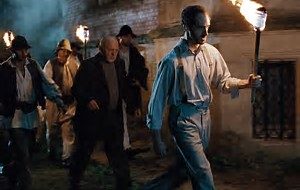 We pondered more the fact that Anderson never questions his own sanity in the face of such happenings, and especially contrasted this to the ‘usual’ doubting gothic heroines. Number 13 is comparable in some ways to Miss Christina (2013, Alexandru Mafeti). In our discussion of this film (which you can find here: https://blogs.kent.ac.uk/melodramaresearchgroup/2017/10/04/summary-of-discussion-on-miss-christina/) we noted that film’s couple, Egor (Tudor Aaron Istodor) and Sanda (Ioana Anastasia Anton), both occupied the position of heroine at various points in the narrative. Despite Number 13’s introduction of a female character, she remains minor, and the focus is on one character, Anderson. Anderson is very different to Egor in Miss Christina. While the former is a prissy and inexperienced scholar, the latter
We pondered more the fact that Anderson never questions his own sanity in the face of such happenings, and especially contrasted this to the ‘usual’ doubting gothic heroines. Number 13 is comparable in some ways to Miss Christina (2013, Alexandru Mafeti). In our discussion of this film (which you can find here: https://blogs.kent.ac.uk/melodramaresearchgroup/2017/10/04/summary-of-discussion-on-miss-christina/) we noted that film’s couple, Egor (Tudor Aaron Istodor) and Sanda (Ioana Anastasia Anton), both occupied the position of heroine at various points in the narrative. Despite Number 13’s introduction of a female character, she remains minor, and the focus is on one character, Anderson. Anderson is very different to Egor in Miss Christina. While the former is a prissy and inexperienced scholar, the latter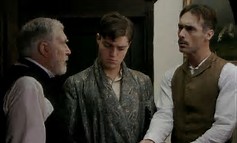 is a passionate, engaged painter. However, similarities to Miss Christina also occur. Anderson’s experiencing of the supernatural is shared by two other men – the landlord Gunton and the lawyer Jenkins. In Miss Christina, the painter Egor is also validated by two men, in his case a medical doctor and a professor of archaeology.
is a passionate, engaged painter. However, similarities to Miss Christina also occur. Anderson’s experiencing of the supernatural is shared by two other men – the landlord Gunton and the lawyer Jenkins. In Miss Christina, the painter Egor is also validated by two men, in his case a medical doctor and a professor of archaeology.
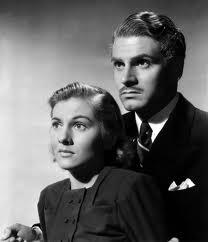 We commented that the equivalent of such fraternal confirmation is usually unavailable to a gothic heroine, since there are often fewer other women in gothic narratives. Furthermore, women in gothic-set narratives (often taking place in the past) rarely have professions. The exceptions are the domestic roles of governess (The Innocents, 1961, Jack Clayton), housekeeper or companion (The Spiral Staircase, 1946, Robert Siodmak). Instead, heroines often enter the space of the gothic house through marriage, as new brides – in Rebecca (1940, Alfred Hitchcock), Gaslight (1940, Thorold Dickinson, 1944 George Cukor) etc. Anderson, however, enters the gothic space of the hotel temporarily, as a man on academic business, which is less likely to be open to a woman travelling alone. Such a situation also occurs in The Woman in Black (2012, James Watkins), in which a lawyer (male, obviously, but also like Professor Anderson, middle-class), gains access to the gothic house for a short period because he is working on legal issues.
We commented that the equivalent of such fraternal confirmation is usually unavailable to a gothic heroine, since there are often fewer other women in gothic narratives. Furthermore, women in gothic-set narratives (often taking place in the past) rarely have professions. The exceptions are the domestic roles of governess (The Innocents, 1961, Jack Clayton), housekeeper or companion (The Spiral Staircase, 1946, Robert Siodmak). Instead, heroines often enter the space of the gothic house through marriage, as new brides – in Rebecca (1940, Alfred Hitchcock), Gaslight (1940, Thorold Dickinson, 1944 George Cukor) etc. Anderson, however, enters the gothic space of the hotel temporarily, as a man on academic business, which is less likely to be open to a woman travelling alone. Such a situation also occurs in The Woman in Black (2012, James Watkins), in which a lawyer (male, obviously, but also like Professor Anderson, middle-class), gains access to the gothic house for a short period because he is working on legal issues.
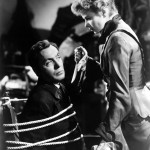 This clearly shows the separation existing between the male and female gothics. While the former centres on a man and uses horror and explanations for what occurs, the latter focuses on a woman and employs terror to invoke and convey a supposedly hysterical response to a woman’s situation. Both Miss Christina and Number 13, focusing more on men, over-explain the cause of the supernatural. We weren’t sure if we approved of a man being the centre of a gothic story, as it is one of the few areas women occupy. While some may view them as passive heroines, it is significant that in our discussion of various films we have focused on the ways in which they take action.
This clearly shows the separation existing between the male and female gothics. While the former centres on a man and uses horror and explanations for what occurs, the latter focuses on a woman and employs terror to invoke and convey a supposedly hysterical response to a woman’s situation. Both Miss Christina and Number 13, focusing more on men, over-explain the cause of the supernatural. We weren’t sure if we approved of a man being the centre of a gothic story, as it is one of the few areas women occupy. While some may view them as passive heroines, it is significant that in our discussion of various films we have focused on the ways in which they take action.
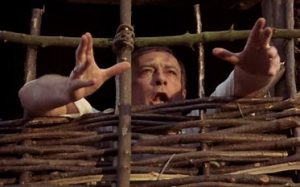 Other texts we mentioned in relation to Number 13 were Ex Machina (2015, Alex Garland) (where the man is also the heroine). Aspects of film style were also referenced as we noted the whispering behind the walls reminded us of The Innocents, and the shadow on the wall of Vampyr (1932, Carl Theodor Dreyer). Although we discussed class at length, we also picked up on the opposition between city and rural evinced in Number 13. Anderson is not only dismissive of the local superstition against the number 13, but seems to feel at risk when walking in the country, seeing local people gathered around burning bins. This particularly reminded us of the sacrifice of the virgin outsider in The Wicker Man (1973, Robin Hardy), and of Shirley Jackson’s unsettling 1948 short story The Lottery.
Other texts we mentioned in relation to Number 13 were Ex Machina (2015, Alex Garland) (where the man is also the heroine). Aspects of film style were also referenced as we noted the whispering behind the walls reminded us of The Innocents, and the shadow on the wall of Vampyr (1932, Carl Theodor Dreyer). Although we discussed class at length, we also picked up on the opposition between city and rural evinced in Number 13. Anderson is not only dismissive of the local superstition against the number 13, but seems to feel at risk when walking in the country, seeing local people gathered around burning bins. This particularly reminded us of the sacrifice of the virgin outsider in The Wicker Man (1973, Robin Hardy), and of Shirley Jackson’s unsettling 1948 short story The Lottery.
If you would like to see some more MR James adaptations, and learn more about the man himself, BBC 4 is devoting Christmas Eve night to the author and his works. You can (re)view Number 13 at 10.40pm.
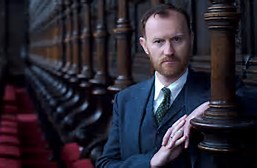 As ever, do log in to comment, or email me on sp458@kent.ac.uk to add your thoughts.
As ever, do log in to comment, or email me on sp458@kent.ac.uk to add your thoughts.
